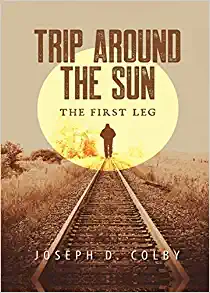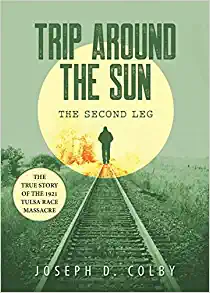
Author Bio:
Joseph Colby, author of "Trip Around the Sun" (First Leg) and (Second Leg)
Book Blurb: It was called the roaring twenties. Bars were known as speakeasies. Radio sped to the inquisitive ear news of the world, Ford sold over a million Model-Ts, and a hardworking man could feed a family of six on ten dollars a day - with a nickel left over.
The year was 1926, a time that a boy of thirteen - with his three siblings, his mother, and father - would take a yearlong travel from California to America's heartland, Missouri.
This is but one leg of the story. You'll experience the challenges endured by our thirteen-year-old-long before there were freeways, air conditioning, and even in places paved roads. When you're a poor, migrant, farm-working family, you may hope for a change or better conditions, but it's probably not coming. To complain about it only makes it worse.
The days turn into weeks for the family as they move firsthand through the elements of their travel. Rain, heat, dust, cold, rain, sunny days, starlit nights, rain - and, oh, let it be known, there was rain. All between each flat tire or breakdown of the car. A boy's character was built and rebuilt each new day.
Book Buy Links:
Editorial Review:
I knew we didn't have much money. Dad and Mother barely got by. A church mouse would starve to death with the crumbs that lay in this family's pockets.
In 1926, in America, in a time period of the prohibition with speakeasies and gangsters in the big cities, life was hard for the working class, in the rural areas of the country, especially for those who got by working as migrant workers. This story is a slice of life of thirteen-year-old Trip (Theodore Roosevelt Ivan Prescott) whose father loved that President and told stories of when he met him on one of his hunting trips out west. There are so many things to love about these two novels (which must be read in succession and not stand-alone) which leans more to easy reads as the family takes off on a road trip from Missouri to Calfornia in a 1922 Reo. So many of the references throughout the narrative took me back to hearing stories from my own family when they did the same thing... from Georgia to California in a Model T... and my grandfather did the exact same thing of bolting items to the running boards to give them more room inside the car. This must have been a common practice back then, not to mention the excitement over seeing a Piggly Wiggly to shop in!
“Look, a Piggly Wiggly!”
“A what?” Dad asked, as did the four of us in the back.
“What's a piggy wiggy?”
“It's Piggly Wiggly,” Mother corrected him. “It's a grocery store. I'd read 'bout 'em in magazines. I've always wanted to shop at one. Go around the block, Jack. I want to see what one looks like inside. Besides we need some things anyway.”
Both of these books show the development of Trip's character as a young man, learning about his parents and about himself and his place in the vast dusty world right before the Great Depression. The nuances of this life resonate on each and every page, and in each and every detail in Trip's life, all fleshed out during this family road trip (the first to visit Trip's sister in California; and the second visiting grandparents on the way back, thus the “First Leg” and the “Second Leg” books)
There is so much packed within this rambling read, more so reading like a memoir than a novel, and really takes a person and reader back to those innocent days when life taught valuable lessons and childhood was filled with swinging on tire swings and walking down dirt roads instead of sitting in front of a TV all day and playing video games.
And complaining was not allowed, even though times were hard without modern conveniences like air conditioning and paved roads, something about this life built strong and resilient young people and Trip is no exception. He watches the details pass in front of his eyes on the inside and outside of the car and learns from his parents on a very deep, and sometimes a very spiritual level, such as this next passage:
I hope when my history is written in the Book of Life that it will say the things that are important. I'm sure it won't say I cured a disease or invented a new gadget. No, I'm positive it won't say those things, 'cause your father and I are working people. You're being raised in a working-class family. It's us, the hard-working people of the country, that make it great. If the Book of Life only says that your father and I were good parents who were well-known and well liked in the neighborhood, then maybe that's all we can ask for. It's at that time that I'll know I'd gotten on the right train.
And not only that, but as the family passes through town after town, they encounter different races – Indians, Blacks, Mexicans, etc. - and with each encounter the children learn valuable lessons about how to treat people and the connection all of them have as humans and as a “family”. Trip learns a lot about racial inequality and about the attitudes of people in the second book, even teaching him about his own need to change things.
Since then I've learned that no matter what the experience, there's always somethin' to learn. You either learn how to or how not to do something. From that moment on, I committed myself never to use the N-word again. Since then I've even made a list of other words or names I don't use.
Honestly, I had to chuckle when one of the characters refers to his favorite book in which some tigers are going to eat a boy but end up chasing each other around and around until they turn to butter. Churning and churning in their own anger and the little boy takes the butter and puts it on his pancakes. Yes, I had this book when I was little... and the lesson taught to Trip is clear in the book and was a delightful addition to the storyline.
“Let the people get mad. If they hate you, then da day might come when everyone that hates will come together and they might start to arguin' between each other and when that all happens, just sit back and watch 'em all fight it out. Before you know it, they've given up or they've killed themselves, either case – problem solved! People that have hate will end up hurtin', destroyin' themselves if you just stand back and let 'em.”
I was beginning to understand the complexities and web-like pattern we all live in. Tap would probably be the first to agree that life isn't fair... 'Take the day and appreciate what you can do, not what you can't do. You never know under what tree you'll find the butter.'
Again, these books are filled with such enjoyable nuances laid out in a clever book which takes you down memory lane and teaches some valuable lessons. It is a cornucopia of life in 1920s America through the eyes of one young boy and these are two books not to be missed. Without a doubt, especially for American readers of historical fiction, these are must read books... and for the rest of the world who probably has their own tales of similar nature, this is a glimpse into the early days of the USA right after WWI, an innocent time when hardships grew character.
*****
“Trip Around the Sun” First Leg and Second Leg both receive four stars each from The Historical Fiction Company.








Comentários